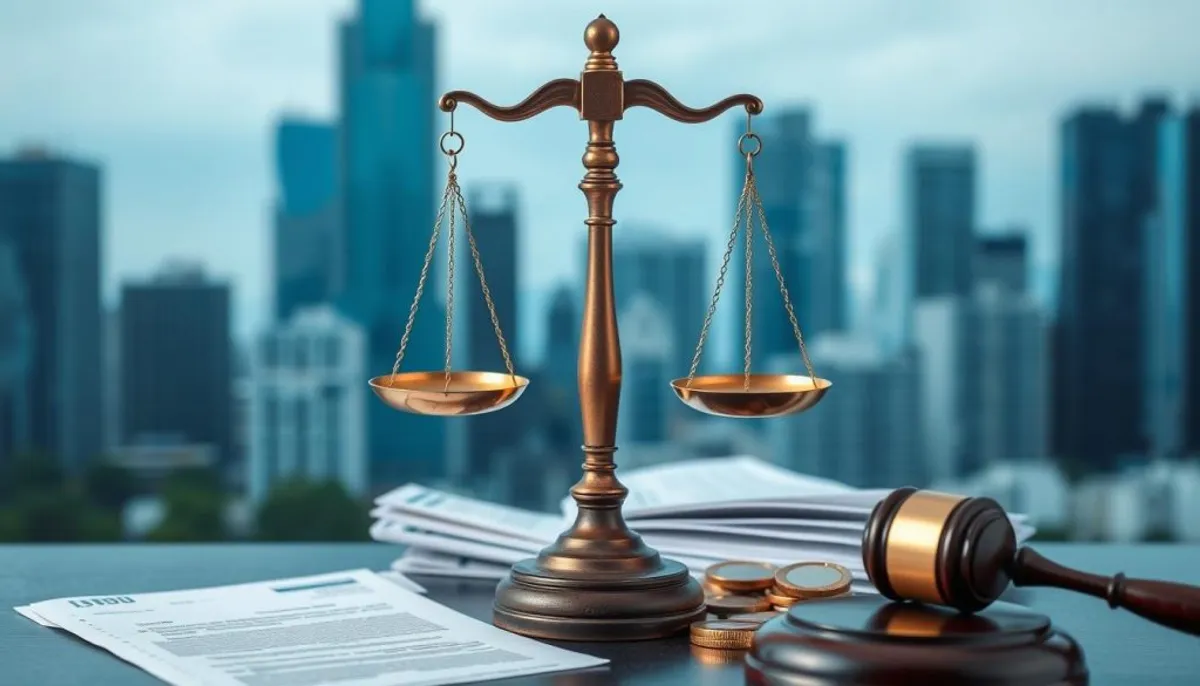Are you pondering, “Can I hire a collection agency to collect a debt?” The affirmative response is yes! Debt collection agencies provide a crucial service for businesses grappling with unpaid accounts. These entities are adept at retrieving outstanding debts, thus enabling you to concentrate on your primary business endeavors.
Engaging professionals for debt recovery can enhance your cash flow and maintain customer relationships. Collection agencies adeptly navigate intricate laws and regulations, ensuring adherence to legal standards throughout the process. They often operate on a contingency basis, charging a percentage of the debts they successfully collect.

Understanding the specializations of debt collection agencies is crucial. Some excel in retrieving funds from large corporations, whereas others are proficient in collecting from smaller or home-based businesses. Most agencies employ skip tracing methods to locate debtors who have relocated without providing a forwarding address.
Before engaging a collection agency, verify their licensing and insurance status. Most states mandate these agencies to hold a license, and reputable firms carry Errors and Omissions Insurance for protection against potential lawsuits. This guarantees that you are collaborating with a professional and compliant service provider.
Key Takeaways
- Collection agencies specialize in recovering outstanding debts
- They typically charge 25% to 45% of the collected amount
- Agencies offer expertise in debt collection laws and regulations
- Different agencies specialize in various types of businesses
- Most states require collection agencies to be licensed
- Reputable agencies carry Errors and Omissions Insurance
- Skip tracing is a common method used to locate debtors
Understanding Debt Collection Agencies and Their Role
Debt collection agencies are pivotal in assisting businesses in retrieving unpaid debts. These entities, functioning as third-party debt collectors, provide specialized services for various types of outstanding accounts. Their expertise is invaluable in navigating the complexities of debt recovery.
What Are Collection Agencies?
Collection agencies serve as intermediaries, recovering debts on behalf of creditors. They employ sophisticated tools and communication strategies to track down debtors and ensure payment. Adherence to the Fair Debt Collection Practices Act is mandatory, ensuring consumer protection against unfair practices.
Types of Debt Collection Services
These agencies offer a range of services, each designed to meet specific needs:
- Consumer debt collection
- Commercial debt collection
- Healthcare debt recovery
- Student loan collection
How Collection Agencies Operate
Agencies employ strategic approaches to debt recovery. They often negotiate settlements, accepting reduced payments, sometimes as low as 25% to 50% of the original debt. Their compensation is typically a percentage of the recovered funds, ranging from 25% to 50%.
| Aspect | Detail |
|---|---|
| Settlement Range | 25% – 50% of original debt |
| Agency Compensation | 25% – 50% of collected amount |
| Calling Hours | 8 a.m. – 9 p.m. |
| Credit Report Impact | Up to 7 years |
Understanding the operations of collection agencies empowers businesses to make informed decisions regarding their accounts receivable. This knowledge is crucial for effective debt management.
Can I Hire a Collection Agency to Collect a Debt?
Struggling with unpaid invoices prompts the question, “Can I hire a collection agency to collect a debt?” The affirmative response is a common practice among businesses. They seek professional debt recovery solutions when their internal efforts are insufficient.
Collection agencies are adept at retrieving various debts, including:
- Credit card balances
- Medical bills
- Unpaid invoices
Before engaging an agency, several factors warrant consideration:
- Legitimacy: Verify the agency’s licensure and bonding status
- Experience: Seek agencies with a proven track record in your industry
- Success rates: Inquire about their debt recovery percentages
- Customer relationships: Assess their approach to maintaining positive interactions
When contemplating the decision to hire a collection agency, consider these statistics:
| Factor | Data |
|---|---|
| Average agency fees | 18% to 50% of recovered debt |
| Recommended wait time before collections | Minimum 90 days |
| Typical agency retention fee | 30% of collected debt |
| Debt buyer purchase rate | As low as one-third of total debt |
Engaging a collection agency can be more economical than pursuing legal action for small debts. Their specialized knowledge in debt recovery is invaluable for businesses lacking such expertise.
Benefits of Professional Debt Collection Services
Professional debt collection services bring substantial benefits to businesses facing challenges in accounts receivable management. These agencies are adept at handling delinquent accounts, leveraging their expertise and resources to significantly enhance your financial health.
Increased Recovery Rates
Debt collection agencies employ specialized techniques and persistent follow-up to increase recovery rates. Their extensive experience in dealing with various debtors, including those who are unresponsive, significantly boosts success in debt recovery. This expertise leads to improved cash flow for your business.
Time and Resource Savings
Outsourcing debt collection to these agencies saves your time and resources. You can redirect your focus to core business activities, while the collection agency handles all communications efficiently. This streamlines the entire process.

Legal Compliance and Protection
Debt collection agencies are well-versed in laws such as the Fair Debt Collection Practices Act. They ensure all recovery efforts comply with federal and state regulations, safeguarding your business from legal risks. These agencies maintain detailed records of all debtor communications, providing valuable evidence if legal action becomes necessary.
Professional Expertise and Tools
Collection agencies employ trained professionals with negotiation skills to engage non-paying customers. They utilize advanced tools and customized strategies to optimize debt recovery. This professional approach not only enhances recovery rates but also helps maintain positive customer relationships, essential for long-term business success.
| Benefit | Impact |
|---|---|
| Higher Recovery Rates | Improved Cash Flow |
| Time Savings | Focus on Core Business |
| Legal Compliance | Reduced Legal Risks |
| Professional Expertise | Optimized Debt Recovery |
How to Choose the Right Collection Agency
Selecting the right debt collection agencies is crucial for effective professional debt recovery solutions. It necessitates a thorough evaluation of several key factors. This ensures you find an agency that perfectly aligns with your business’s specific needs.
Industry Experience and Specialization
Seek out collection agencies with deep expertise in your industry. For instance, sectors like healthcare or construction have unique regulatory landscapes and operational nuances. Their specialized knowledge can significantly enhance recovery rates and ensure adherence to industry-specific compliance standards.
Licensing and Credentials
Ensure the agency holds the necessary licenses to operate within your state, crucial for handling national clients. Verify their credentials, including bonding and insurance. Investigate their reputation through online reviews and Better Business Bureau ratings.
Technology and Resources
Assess the agency’s technological prowess. Modern debt collection agencies leverage advanced software for skip tracing and access vast databases. Opt for agencies that provide online portals for real-time recovery rate updates.
Consider the agency’s size relative to your needs. Smaller agencies might offer more tailored service for smaller claim volumes, whereas larger ones excel in handling high volumes efficiently. Some agencies blend both approaches, catering to businesses with diverse claim sizes.
| Factor | Small Agency | Large Agency |
|---|---|---|
| Personalized Service | High | Moderate |
| Volume Capacity | Low | High |
| Industry Specialization | Often Niche | Broad |
| Technological Resources | Limited | Extensive |
By meticulously evaluating these factors, you can select a collection agency that resonates with your business ethos. This choice will not only optimize debt recovery but also bolster your financial performance.
Understanding Collection Agency Fees and Pricing
Outsourcing debt recovery necessitates a clear understanding of collection agency pricing models. Agencies predominantly employ a contingency-based model. This model ties fees to successful debt recoveries, aligning their interests with yours. It ensures they are incentivized to collect effectively.
Contingency fees are influenced by several variables, including debt age and average balance. For debts 30-90 days old, fees start around 20%. As debts mature, fees escalate, potentially reaching 50% for accounts over two years. Larger balances, exceeding $500,000, often attract lower rates, potentially as low as 10%.
Industry type also plays a role in pricing. For instance, healthcare debt collection tends to have lower fees compared to property management accounts. Some agencies offer flat-fee structures, beginning at $15 per account. This can be advantageous in specific scenarios.
| Debt Age | Contingency Fee | Average Balance | Contingency Fee |
|---|---|---|---|
| 30-90 days | 20% | $1-$1000 | 35% |
| 90-180 days | 25% | $1000-$5000 | 25% |
| 6-12 months | 33% | $5000-$50,000 | 20% |
| 1-2 years | 40% | $50,000-$500,000 | 15% |
| 2+ years | 50% | $500,000+ | 10% |
When selecting a collection agency, evaluate their success rate alongside their fees. An agency with a higher fee but superior recovery rate might be more economical over time. It’s essential to discuss pricing structures upfront to prevent unexpected costs and foster a transparent partnership in debt recovery efforts.
Legal Considerations and Compliance Requirements
Debt collection agencies face a labyrinth of laws and regulations. These mandates are designed to uphold fairness and shield consumers from exploitative practices. We will examine the pivotal legal elements that define the debt collection domain.
Fair Debt Collection Practices Act
The Fair Debt Collection Practices Act (FDCPA) establishes the benchmark for debt collection in the United States. It prohibits the use of coercive and deceitful methods. Collectors are barred from initiating contact before 8 a.m. or after 9 p.m. They must furnish debt validation within a five-day timeframe post-initial outreach. The FDCPA also prohibits the disclosure of debt information to third parties, such as family members or employers.
State-Specific Regulations
States across the nation have enacted their own debt collection statutes. These laws often align with the FDCPA but may introduce additional stipulations. Some states mandate licensing or bonding for debt collection agencies. Others extend their regulatory scope to include original creditors. It is imperative for agencies to be well-versed in the laws of the states where they operate.
Consumer Protection Laws
Consumer protection transcends the FDCPA. The Fair Credit Reporting Act empowers consumers to challenge inaccuracies in their credit reports. Various states have enacted laws against unfair and deceptive practices in debt collection. These statutes aim to protect consumers from unjust treatment.

| Legal Requirement | Description |
|---|---|
| Contact Hours | 8 a.m. to 9 p.m. only |
| Debt Verification | Within 5 days of initial contact |
| Communication Methods | Phone, letters, email, text messages allowed |
| Third-Party Discussions | Prohibited without consent |
Legal compliance and protection are of utmost importance in the debt collection industry. Agencies must diligently stay abreast of federal and state laws to circumvent costly infractions and uphold ethical standards.
Introducing ti3: A Modern Alternative to Traditional Collection Agencies
In today’s business environment, late payments are a major hurdle. With 89% of small-to-medium businesses facing growth hurdles due to delayed payments, the necessity for effective accounts receivable management is paramount. ti3 emerges as a pioneering SaaS platform, aiming to transform professional debt recovery solutions.
Automated Payment Reminders
ti3 confronts the challenge of late payments with its automated reminder system. This feature is invaluable, given that 30% of outstanding invoices necessitate three or more reminders for resolution. By automating this function, ti3 enables businesses to reclaim the 14 hours weekly that 65% of small business owners dedicate to payment-related administrative tasks.
Streamlined Debt Recovery Process
The platform introduces a streamlined debt recovery methodology, catering to the 40% of businesses lacking a defined process. ti3’s efficient system is poised to enhance recovery rates, potentially lowering the average outstanding balance of £6,142 per invoice.
Client Relationship Management
ti3 stands out in maintaining positive client relationships while pursuing payments. This approach is critical, as 50% of small and medium businesses turn to personal finances due to late payments. By nurturing good relationships, ti3 empowers businesses to sidestep this issue, ensuring timely payments.
| Feature | Benefit | Impact |
|---|---|---|
| Automated Reminders | Time Savings | Reclaim 14 hours/week |
| Streamlined Process | Improved Recovery | Reduce £6,142 average outstanding balance |
| Relationship Management | Financial Stability | Avoid personal finance use for 50% of SMBs |
Steps to Start Working with a Collection Agency
Outsourcing debt recovery can significantly benefit businesses facing unpaid invoices. To initiate collaboration with a collection agency, adhere to these guidelines. This ensures the selection of optimal professional debt recovery solutions tailored to your specific requirements.
Begin by evaluating your debt collection needs. Consider the duration of your overdue invoices, as agencies generally handle debts at least 90 days past due. It’s crucial to remember that late payments can drastically affect your cash flow and operational efficiency.
Thoroughly research potential agencies. Seek those with industry-specific experience and a solid track record. Verify their licensing and adherence to laws such as the Fair Debt Collection Practices Act.
- Request proposals from shortlisted agencies
- Evaluate their recovery rates and fee structures
- Interview top candidates to gauge their expertise
- Negotiate terms and performance metrics
- Sign a clear, written contract
When considering debt recovery outsourcing, look for agencies offering additional services like invoice purchasing for immediate financial relief. Keep in mind that collection agencies usually charge a percentage of the recovered amount as their fee.
| Metric | Value |
|---|---|
| U.S. Consumer Debt Growth (2019-2020) | 6% |
| Debt Collection Industry Growth (2021) | 4.4% |
| Average Time for Agency Licensing | 4-6 months |
By adhering to these steps and utilizing professional debt recovery solutions, you can enhance your chances of recovering overdue payments. This will help maintain a healthy cash flow for your business.
Conclusion
Hiring a collection agency can significantly alter a business’s financial landscape, offering a crucial lifeline for those struggling with cash flow. With a staggering 82% of companies failing due to such issues, the role of debt collection agencies becomes paramount. These professionals operate on a contingency basis, ensuring their motivation to recover your funds is unwavering.
Debt collection agencies bring to the table a wealth of expertise and legal acumen. They adhere to the strict guidelines of the Fair Debt Collection Practices Act, safeguarding both businesses and debtors. For example, collectors are prohibited from contacting debtors before 8 a.m. or after 9 p.m. They are also limited to seven calls per week, ensuring a respectful and efficient approach.
Modern alternatives, such as ti3, introduce automated payment reminders and streamlined processes. Whether opting for a traditional agency or a cutting-edge solution, the overarching objective remains the same: to recover your funds while preserving professional relationships. By entrusting debt collection to experts, you can redirect your focus towards business growth and development.
RelatedRelated articles



